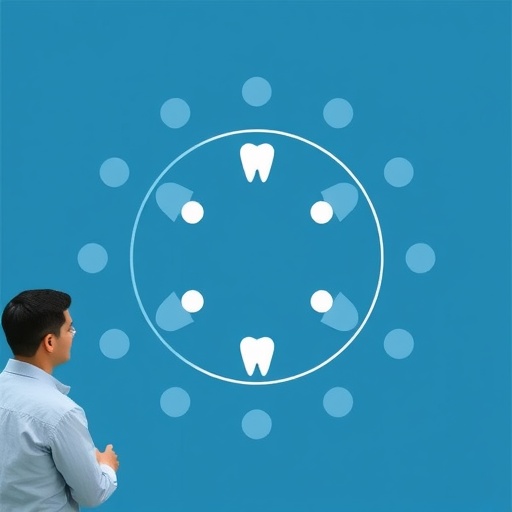In an innovative and impactful pilot study, researchers are challenging traditional educational methodologies in dental schools through a novel construct known as the “pedagogical circle.” Conducted by a team led by Savard, Becquet, and Bodin, this approach aims not only to enhance learning outcomes for undergraduate dental students but also to mitigate the stressors commonly associated with dental education. As the field of dental education evolves, this groundbreaking study provides a vital roadmap for redefining how educational experiences can be optimized.
The necessity for change in dental education stems from the high-pressure environment that students often experience. The legacy of rote learning, rigid structures, and standardized testing can be detrimental, affecting students’ mental health and overall learning comprehension. This research addresses the urgent need to introduce progressive educational techniques capable of fostering a supportive learning environment. The pedagogical circle represents a fresh perspective, where collaboration, integration of knowledge, and active participation form the pillars of the educational experience.
At the heart of the pedagogical circle is the idea of cooperative learning, where students engage in dialogue, share insights, and collectively explore challenging concepts. This interactive model contrasts sharply with conventional lecture-based learning, promoting a sense of community and shared responsibility among peers. Such a shift in paradigm is not only timely but necessary, enabling students to cultivate essential skills such as critical thinking and problem-solving, which are crucial in their future practices.
Furthermore, the study highlighted the potential connection between this innovative pedagogical strategy and reduced stress levels among students. Recent trends indicate that mental health challenges, such as anxiety and depression, are increasingly prevalent among medical and dental students. As educational institutions strive to create healthier learning environments, the findings from this pilot study suggest that fostering collaboration and support among students can yield significant benefits for academic performance and overall well-being.
To effectively implement the pedagogical circle, the research team employed a series of structured group activities designed to encourage peer-to-peer engagement. These activities not only incorporated varied learning modalities but also aimed to build confidence through collaborative problem solving. The results demonstrated that students who participated in these group settings reported higher levels of satisfaction and a deeper understanding of the material presented.
The study utilized qualitative and quantitative methodologies to assess the impact of this pedagogical approach. Surveys, interviews, and academic performance indicators served as critical tools for gathering data, revealing that students demonstrated improved comprehension of intricate subjects. Notably, the positive outcomes observed in the pilot study have paved the way for further exploration into the long-term effectiveness of this model in diverse educational settings.
As educational leaders begin to recognize the potential of the pedagogical circle, there are several implications worth considering. Foremost, this approach serves as a reminder of the importance of adaptability in educational frameworks. As the medical and dental fields continue to grow and evolve, the need for institutions to embrace innovative practices becomes paramount. The pedagogical circle may very well represent a pivotal turning point in how future dental professionals are trained.
Moreover, the findings from this research may have implications that extend beyond the realm of dental education. Various disciplines could benefit from adapting the principles of the pedagogical circle, fostering a culture of collaboration and mutual support. By transcending traditional barriers in education, a more robust foundation for interdisciplinary learning may emerge, ultimately enhancing the educational landscape.
In conclusion, the pilot study conducted by Savard et al. presents a compelling case for re-evaluating the methodologies employed in dental education. The pedagogical circle stands as a testament to the changing tides in educational practices, addressing critical issues such as stress and engagement among students. As the study garners attention, it holds the potential to inspire institutions worldwide to reconsider their teaching approaches, championing a new era of educational innovation.
As we continue to explore these promising findings, it becomes increasingly clear that the future of dental education—and perhaps broader educational practices—lies in collaboration, support, and innovation. This transformative approach speaks not only to the needs of students but also to the demands of a rapidly evolving healthcare landscape. The establishment of a pedagogical circle may indeed prove to be just the beginning, setting the stage for a new chapter in learning, mentorship, and professional development.
Such efforts underscore a movement toward student-centric models that prioritize emotional well-being alongside academic success. As the discourse surrounding mental health in educational contexts grows, initiatives like the pedagogical circle offer a proactive solution to cultivating an enriching, less stressful educational experience. The outcomes from this study may influence policymakers, educators, and administrators, urging them to adopt similar frameworks aimed at creating thriving learning environments.
While this research represents an inspiring initiative, continuous evaluation and iteration will be crucial in fine-tuning the pedagogical circle model for broader implementation. Ultimately, the commitment to fostering meaningful educational experiences can redefine the trajectory of dental education, helping students not only excel academically but also prepare for the responsibilities that await them in their professional journeys.
Subject of Research: Innovative pedagogical approaches in undergraduate dental education.
Article Title: The pedagogical circle: an innovative approach to enhance learning and reduce stress in undergraduate dental education – a pilot study.
Article References:
Savard, G., Becquet, H., Bodin, A. et al. The pedagogical circle: an innovative approach to enhance learning and reduce stress in undergraduate dental education – a pilot study.
BMC Med Educ 25, 1560 (2025). https://doi.org/10.1186/s12909-025-08156-w
Image Credits: AI Generated
DOI: https://doi.org/10.1186/s12909-025-08156-w
Keywords: dental education, pedagogical circle, innovative teaching, stress reduction, collaborative learning.




